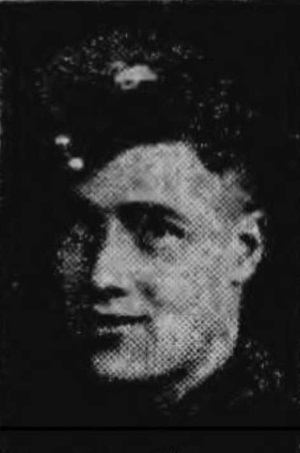Ralph Jones



| Surname | Jones | |
| Forename/s | Ralph | |
| Rank | Private | |
| Service Number | 4982817 | |
| DOB | Circa 1920 | |
| Address | ||
| Date & place of death/details | 24/5/1945 age 24 | |
| Regiment & Unit | 1st & 5th Battalion, The Sherwood Foresters (Nottinghamshire & Derbyshire Regiment) | |
| Service details | ||
| Military Awards? | ||
| Married? Children? | ||
| Any photographs | ||
| Derbyshire Times Obituary |
.jpg)
.jpg) .jpg) |
|
| Parents names | Mr Thomas & Mrs Hilda Jones | |
| Parents address |
14 Queen Victoria Road, New Tupton |
|
| Grave location or memoria location | Buried at Sydney war
Cemetery, Australia. 2Z.D.14 |
|
| Living relatives? | ||
| Any other information |
He was employed as a
clerk at Chesterfield Tube Company. He was also
a member of the Tupton Auxiliary Fire Service,
before he enlisted. In June 1940 when
aged 20, Ralph joined the 1st/5th
Battalion the Sherwood Foresters. This battalion
was in the process of being refitted following
the Dunkirk retreat and became part of the 18th
Infantry Division. Private Joseph Kirk from
Tupton was also in the 1st/5th
Sherwood Foresters. In December 1941
Ralph and his battalion were on a convoy bound
for the Middle East, when news came that the
Japanese had entered the war attacking Malaya,
The Philippines and Pearl Harbour. The convoy
was diverted to reinforce the Singapore
Garrison. The 18th
Infantry Division arrived at Singapore in stages
from the 29th January to the 5th
February. By this time the Japanese Army
had advanced down the length of the Malayan
Peninsular and were about to attack Singapore
itself. The battle for
Singapore started on the 8th February
1942 and was to last for 7 days. The 1st/5th
Sherwood Foresters despite having 2 months at
sea and being trained for open, not jungle
warfare, were thrown straight into the battle
and involved in the fierce fighting at Bukit
Timah. This was to no avail, as the Japanese had
overrun the food and fuel dumps for Singapore
and cut off the water supply to the city. Despite outnumbering
the Japanese 2:1, being low on ammunition and
supplies, on the 15th February 1942
General Percival surrendered the city placing
85,000 British and Australian troops into
captivity joining the 50,000 already captured in
the earlier part of the campaign. Churchill was
to comment, ‘’This was the worst disaster and
largest capitulation in British History’’ Ralph would spend
over 3 years in captivity until he died in a
Japanese POW camp on the 24th May
1945. This 3-year period for allied prisoners
was one of brutality, suffering, starvation and
death. Ralph would almost definitely have spent
time in the notorious Changi prison and it was
also possible that he was sent to work as forced
labour on the Siam- Burma Railway (Death
railway). Despite Ralph’s
obituary stating that he died in a Japanese POW
camp, Ralph is buried at Sydney War Cemetery,
Australia. No details as to the
circumstances of his body being repatriated to
this location.
|

.jpg)